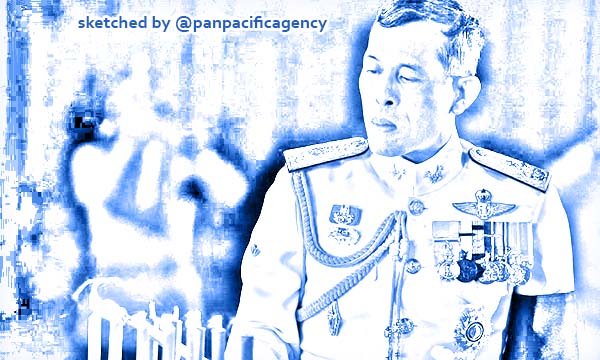[Analytics] Thai domestic politics threatens to derail its diplomacy

Thailand's King Maha Vajiralongkorn. Photo: Twitter. Sketched by the Pan Pacific Agency.
Thailand has been a treaty ally of the United States since 1954, but its political direction since 2006 — amid warming strategic ties with Beijing — is placing serious pressure on the alliance. Greg Raymond specially for the East Asia Forum.
Rumbles within the United States about the relationship have become louder in recent times. Some commentators say that the two countries no longer share any strategic interests. A rupture is not imminent and the military-to-military relationship remains strong — the two countries hold more than 60 bilateral exercises a year and Thailand co-hosts the region’s largest multilateral exercise, Cobra Gold. But it is worth asking: what if the United States decided to end the 66-year-old treaty alliance?
The possibility arises because domestic influences are pulling Thai foreign policy in different directions. On the one hand, Thailand’s Sino-Thai business families would welcome a more overt move into China’s orbit. They led the charge for economic integration with China after the economic reforms implemented under former Chinese President Deng Xiaoping, but were scarred by the Red Shirt protests in 2010 and have become critical of US democracy crusades.
But the monarchy, top echelons of the Thai military and the aristocracy retain a preference for some sort of Western alignment. Few send their children to school in China but many still enrol their children in the US and British education systems. The current army chief and fervent royalist Apirat Kongsompong — despite his distaste for Thailand’s liberal political parties — looks to the US military for friendship, doctrine and equipment. King Vajiralongkorn still remembers fondly his time at Australia’s military college, Duntroon, and was engaged in active combat against Thai communists in the 1970s.
Thailand’s foreign relations have become increasingly entwined in its domestic politics since the coup of 2006, which unleashed a period of mass protest and political contest bereft of rules. Thai voters remain divided on whether sovereignty resides with the people or with the monarchy.
Subsequent US censure of Thailand over its slide towards authoritarianism has affected the way the middle ranks of the Thai military see the United States. In a survey of 1800 Thai military officers conducted between 2015 and 2017, respondents rated the United States as the ‘Great Power’ most likely to threaten Thailand.
Misgivings over continuing US commitment have played a part in changing Thai thinking. Thailand has prepared for life without a trans-Pacific alliance for decades. The departure of US troops from mainland Southeast Asia in 1976 was a profound strategic shock for Thai policymakers. Thailand adapted by coming to a rapprochement with China and eventually Vietnam.
When the Cold War ended, Thailand pushed ahead with a liberal foreign policy aimed at turning battlefields into market places, in part through deeper investment in ASEAN. Thailand’s sense of ownership of ASEAN stems partially from its central role in founding the bloc. It also subscribes to the notion that ASEAN helps Southeast Asian countries to balance their interests against various great powers, including through ASEAN’s combined economic weight and role as a strategic convenor.
ASEAN is also a vehicle for Thailand’s own aspirations for sub-regional leadership. Thailand’s good fortune to be the only mainland Southeast Asian country not ravaged by colonialism, proxy wars or genocide in the twentieth century gave it a head start on its neighbours.
In the 1990s, as Thailand experienced double-digit economic growth, it sought to entrench itself as the logistical and economic hub for mainland Southeast Asia — the link between mainland and maritime Southeast Asia. This vision of Thailand as a Suvarnabhumi, or ‘Golden Land’, has remained part of Thai national identity.
Thailand continues to pursue the Suvarnabhumi vision by developing industrial parks and ports on the eastern seaboard. Industrial policies like the Eastern Economic Corridor also link three airports via high-speed rail.
These policies are an attempt by the authoritarian regime to gain legitimacy by stimulating economic growth amid the fallout from the US–China trade war. The military-dominated regime also enjoys cosy relations with its counterparts in Myanmar, Laos and Cambodia, all of which have cooperated across their borders to repress dissent.
But the Suvarnabhumi vision is now coming up against a competing regional vision — China’s. When the vision was first enunciated, Thailand was in a relatively strong economic, diplomatic and military position.
Now, although Thailand remains an important investor for Myanmar, Laos and Cambodia, it is no longer the economic partner of choice. Since the Belt and Road began in 2013, China’s Southeast Asian infrastructure projects as well as its Special Economic Zones have proliferated.
There are signs that Thailand is beginning to feel strategically constricted and is subtly pushing back. It is resisting China’s push to blast the remaining rapids from the Mekong and is ignoring its push for a canal through the Isthmus of Kra. While China is rapidly building the high-speed rail link from Kunming to Vientiane, Thailand is delaying its leg from Nong Khai to Bangkok amid tough negotiations with Beijing.
Thailand is also moving to shore up the Ayeyawady–Chao Phraya–Mekong Economic Cooperation Strategy as an alternative sub-regional forum to China’s Lancang Mekong Cooperative.
Thailand’s strategic culture invests great stock in 19th-century monarch Chulalongkorn’s heroic diplomacy with colonial powers. Its elite see parallels with the current era of supposed ‘great power’ competition and US–China antagonism. But as Thailand succumbs to authoritarianism and expands its security ties with China, it risks its treaty alliance with the United States.
Greg Raymond is Lecturer in the Strategic and Defence Studies Centre at the Australian National University.